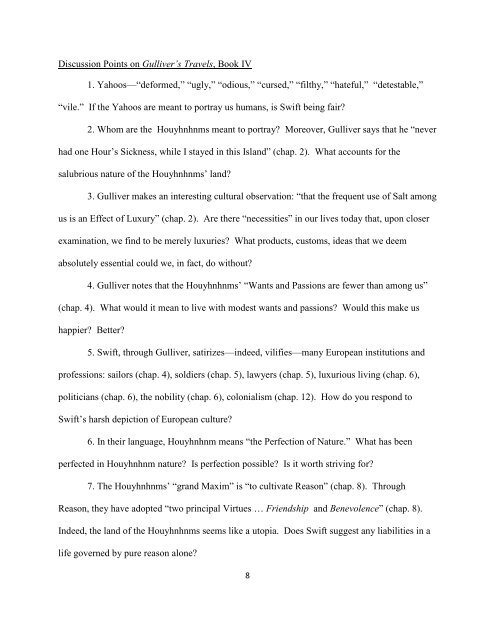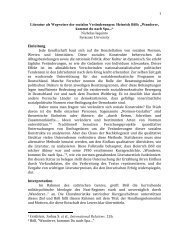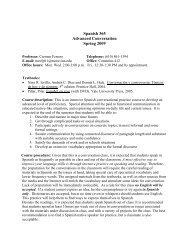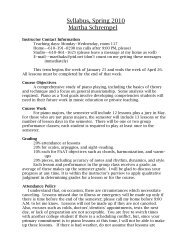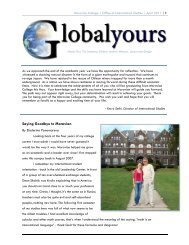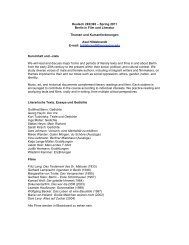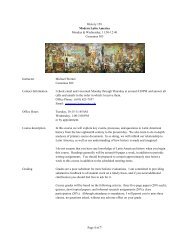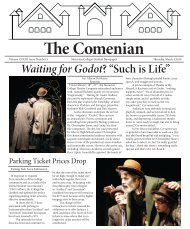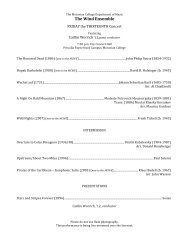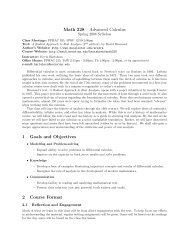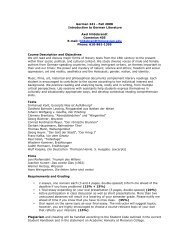Satire in the 18th Century NEH Summer Institute ... - Moravian College
Satire in the 18th Century NEH Summer Institute ... - Moravian College
Satire in the 18th Century NEH Summer Institute ... - Moravian College
Create successful ePaper yourself
Turn your PDF publications into a flip-book with our unique Google optimized e-Paper software.
Discussion Po<strong>in</strong>ts on Gulliver’s Travels, Book IV<br />
1. Yahoos––“deformed,” “ugly,” “odious,” “cursed,” “filthy,” “hateful,” “detestable,”<br />
“vile.” If <strong>the</strong> Yahoos are meant to portray us humans, is Swift be<strong>in</strong>g fair?<br />
2. Whom are <strong>the</strong> Houyhnhnms meant to portray? Moreover, Gulliver says that he “never<br />
had one Hour’s Sickness, while I stayed <strong>in</strong> this Island” (chap. 2). What accounts for <strong>the</strong><br />
salubrious nature of <strong>the</strong> Houyhnhnms’ land?<br />
3. Gulliver makes an <strong>in</strong>terest<strong>in</strong>g cultural observation: “that <strong>the</strong> frequent use of Salt among<br />
us is an Effect of Luxury” (chap. 2). Are <strong>the</strong>re “necessities” <strong>in</strong> our lives today that, upon closer<br />
exam<strong>in</strong>ation, we f<strong>in</strong>d to be merely luxuries? What products, customs, ideas that we deem<br />
absolutely essential could we, <strong>in</strong> fact, do without?<br />
4. Gulliver notes that <strong>the</strong> Houyhnhnms’ “Wants and Passions are fewer than among us”<br />
(chap. 4). What would it mean to live with modest wants and passions? Would this make us<br />
happier? Better?<br />
5. Swift, through Gulliver, satirizes—<strong>in</strong>deed, vilifies—many European <strong>in</strong>stitutions and<br />
professions: sailors (chap. 4), soldiers (chap. 5), lawyers (chap. 5), luxurious liv<strong>in</strong>g (chap. 6),<br />
politicians (chap. 6), <strong>the</strong> nobility (chap. 6), colonialism (chap. 12). How do you respond to<br />
Swift’s harsh depiction of European culture?<br />
6. In <strong>the</strong>ir language, Houyhnhnm means “<strong>the</strong> Perfection of Nature.” What has been<br />
perfected <strong>in</strong> Houyhnhnm nature? Is perfection possible? Is it worth striv<strong>in</strong>g for?<br />
7. The Houyhnhnms’ “grand Maxim” is “to cultivate Reason” (chap. 8). Through<br />
Reason, <strong>the</strong>y have adopted “two pr<strong>in</strong>cipal Virtues … Friendship and Benevolence” (chap. 8).<br />
Indeed, <strong>the</strong> land of <strong>the</strong> Houyhnhnms seems like a utopia. Does Swift suggest any liabilities <strong>in</strong> a<br />
life governed by pure reason alone?<br />
8


